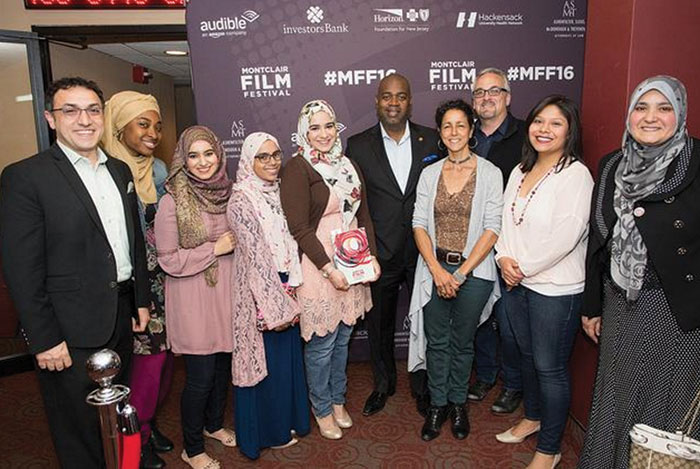 |
| Screening at the Montclair Film Festival. (L-R): Mohamed Alsiadi, Halimah Mahmoud, Sohyla Sayedahmed, Hamna Saleem, Dina Sayedahmed, Newark Mayor Ras Baraka, Julie Winokur, Tim Raphael, Marisol Conde-Hernandez, Sahar Sayedahmed. |
NEWARK — At a time when Islamophobia is on the rise, young Muslim Americans, especially hijabis, who wear their belief proudly remain strong — building their own podiums to break stereotypes.
Last spring, Dina Sayedahmed and Hamna Saleem, two journalism students studying at Rutgers University, took a class associated with “Newest Americans,” a digital magazine that tells the visual stories of diverse cultures.
After watching Buzzfeed’s social experiment video — where non-Muslim women wore the hijab for a day and narrated their experiences — in class, Sayedahmed and Saleem felt the urge to produce their own video, “Hijabi World.” They were tired of being hushed and spoken for.
“We were tired of being spoken over and being silenced by women who don’t observe hijab,” Sayedahmed said. “But there were also many other things that factored into the making of ‘Hijabi World.’ ‘Hijabi World’ was dedicated to Deah Barakat and Yusor and Razan Abu-Salha, who were shot execution-style in their North Carolina home, because Hamna and I hoped to tackle Islamophobia and misconceptions held about Muslims and specifically, hijabis, through the film.”
 |
| Ibadat Qayyum tries different hijab styles. |
The women created a storyboard for their shoot and started recruiting more hijabis to participate in the film. After they drafted about 20 hijabi women, Saleem and Sayedahmed interviewed and conversed with them for two to three hours, relieving all their allied frustrations and struggles.
“We were all sharing very similar experiences and undergoing very similar challenges and struggles,” Sayedahmed said. “We laughed at the list of absurd questions people asked and sighed heavily as we recounted drive-by comments and other forms of harassment and discrimination. But it was rare that we ever sat down, validated our emotions and decompressed together. There is a certain type of love that blooms from shared struggles and, I think, at that meeting and throughout our filming sessions, we realized this kind of love.”
At the end of the spring semester, the aspiring journalists finished their first draft of “Hijabi World”, which was displayed at the “Newest Americans” retreat. Both photojournalist and filmmaker Ed Kashi and his wife, writer and filmmaker Julie Winokur, watched it. The couple offered to produce and refashion the film through innovative technologies.
“Over the course of a few months, Julie and Ed helped us tighten and reproduce ‘Hijabi World’ — originally called ‘Taking Back the Mic’ — into what it is now,” Sayedahmed said.
In the film, eight young Muslim women — including Sayedahmed and Saleem — all with diverse backgrounds, seized the microphone and described their experience wearing the hijab in the U.S. They emphasized that they were never forced to wear it like many mistakenly think, but decided to do so proudly on their own.
“If you have ever worn a hijab or even walked around with someone who does, you can feel the undercurrent of tension it elicits on American streets,” Winokur, ‘Newest Americans’ producer, wrote for the New York Times. “‘Hijabi World’ allows young Muslim women to express what it’s like coming of age in America in a time of xenophobia. The film allows them to set the record straight about when and why they started to wear the head scarf and to answer for themselves how they balance American feminism with cultural and religious tradition. They stare straight ahead and announce, ‘We are here and we have a voice.'”
Lately, Sayedahmed said Islamophobia troubles her the most when she applies for jobs and is called for interviews. Bothersome thoughts like whether her “interviewee will be racist or Islamophobic or sexist or anti-immigrant” come to mind and stress her for days before the interview.
“Honestly, I just want people to learn how to chill when they see a hijabi,” Sayedahmed said. “Get over it, get used to it, stop being afraid, stop making assumptions and stop speaking over us. If you have a question, ask (respectfully and without entitlement). If you want to educate people on hijab, have an actual hijabi do it. Be a good ally and give her the platform.”
She also advised hijabis struggling and experiencing hate to be aware of their environments and to always “own” their individuality without allowing someone to narrate it for them. She encouraged them to hold a microphone and state the truth.
“We cannot afford to be silent or silenced,” Sayedahmed said.
“Hijabi World” is produced by Rutgers University, Newark; Talking Eyes and VII Photo. The New York Times and The Atlantic also published the film, which earned an “official selection” at the Montclair Film Festival and an honorable mention at Harlem’s People’s Film Festival. More than a million people viewed it.






Leave a Reply